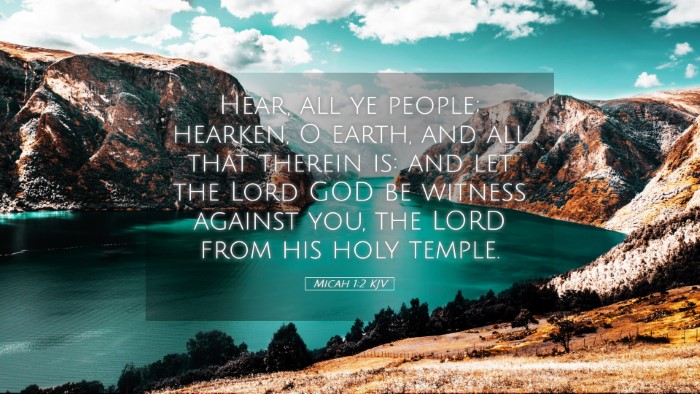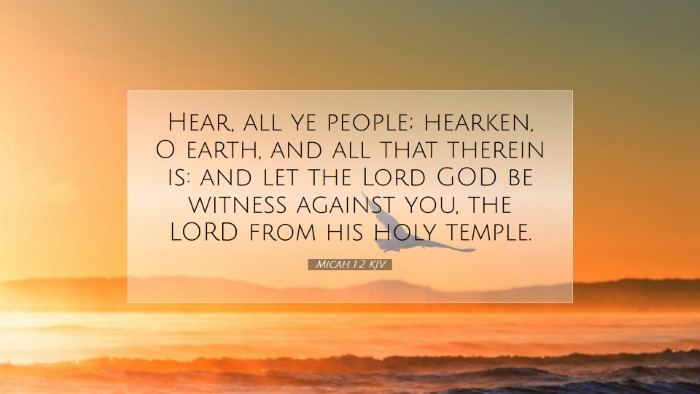Old Testament
Genesis Exodus Leviticus Numbers Deuteronomy Joshua Judges Ruth 1 Samuel 2 Samuel 1 Kings 2 Kings 1 Chronicles 2 Chronicles Ezra Nehemiah Esther Job Psalms Proverbs Ecclesiastes Song of Solomon Isaiah Jeremiah Lamentations Ezekiel Daniel Hosea Joel Amos Obadiah Jonah Micah Nahum Habakkuk Zephaniah Haggai Zechariah MalachiMicah 1:2
Micah 1:2 KJV
Hear, all ye people; hearken, O earth, and all that therein is: and let the Lord GOD be witness against you, the LORD from his holy temple.
Micah 1:2 Bible Commentary
Commentary on Micah 1:2
Verse: “Hear, all you peoples; listen, O earth and all that is in it. Let the Lord God be a witness against you, the Lord from His holy temple.” (Micah 1:2)
Introduction
The book of Micah serves as a clarion call to heed the words of the Lord, blending prophetic warning with the promise of future restoration. Micah, a contemporary of Isaiah, delivers a message that addresses both social injustices and spiritual failures among the people of Israel and Judah. In Micah 1:2, the prophet summons all creation to witness the Lord’s charge, indicating the gravity of the situation and the certainty of divine judgment.
Contextual Analysis
This verse falls within the prophetic tradition, as Micah stands as a voice of both warning and hope. The call to “hear” and “listen” underscores the urgency of the message. As seen in commentaries by Matthew Henry and Albert Barnes, the language of the verse underscores the universality of the divine witness — that both mankind and creation itself are called to recognize God's authority.
Insights from Commentaries
- Matthew Henry Commentary: Henry elaborates on the theological implications of God calling upon “all you peoples” and “the earth” to witness His coming judgment. He reflects on the Lord being an impartial witness and emphasizes the worldwide scope of God's reign, indicating that no one is exempt from His judgment.
- Albert Barnes Notes: Barnes highlights the significance of God's “holy temple” as the seat of His presence and authority. He notes that the temple symbolizes both a place of worship and a reminder of God’s holiness. The warning signifies a divine assessment of moral and spiritual integrity, with a focus on accountability.
- Adam Clarke's Commentary: Clarke remarks on the poetic structure of the passage. He notes that by invoking the earth and everything within it, Micah implies a cosmic recognition of God's sovereignty. Clarke highlights that this call serves both as a lament for the sins of the people and a declaration of God's providence over all creation.
Theological Implications
The invocation of the earth and all people signifies a fundamental aspect of Biblical theology where God’s interactions with humanity are not confined to Israel alone. As pastoral leaders and scholars reflect upon this, the inclusion of all creation in the witness to God’s actions invites deeper discussions about God’s justice, mercy, and the relationship between Creator and creation. As reflected in Henry's commentary, this theme echoes through both the Old and New Testaments, culminating in the message of the Gospel.
Practical Applications
This passage not only serves as a prophetic warning but also as a call for reflection and action. Here are several practical applications:
- The Call to Listen: Pastors are encouraged to remind congregations of the importance of spiritual attentiveness in hearing the Word of God. The act of listening to God’s voice aids in faithful living.
- Divine Accountability: Christians are called to recognize that their actions are subject to divine observation and judgment. Understanding this encourages ethical behavior and integrity in personal and communal life.
- Awareness of God's Sovereignty: Micah’s words encourage believers to acknowledge God’s ultimate authority over all aspects of life. This awareness fosters a greater dependence on God amidst societal injustices and personal trials.
Conclusion
Micah 1:2 invites all individuals and creation to recognize the lordship of God and the seriousness of His covenant. As pastors, theologians, and students delve into its rich meanings, the sophistication of Micah’s prophetic voice continues to resonate, providing both a challenge to sin and a hope for redemption. Through careful study and reflection, the insights offered by traditional commentaries combine to enrich our understanding of God’s nature, His expectations from humanity, and the overarching narrative of God’s plan for restoration.


